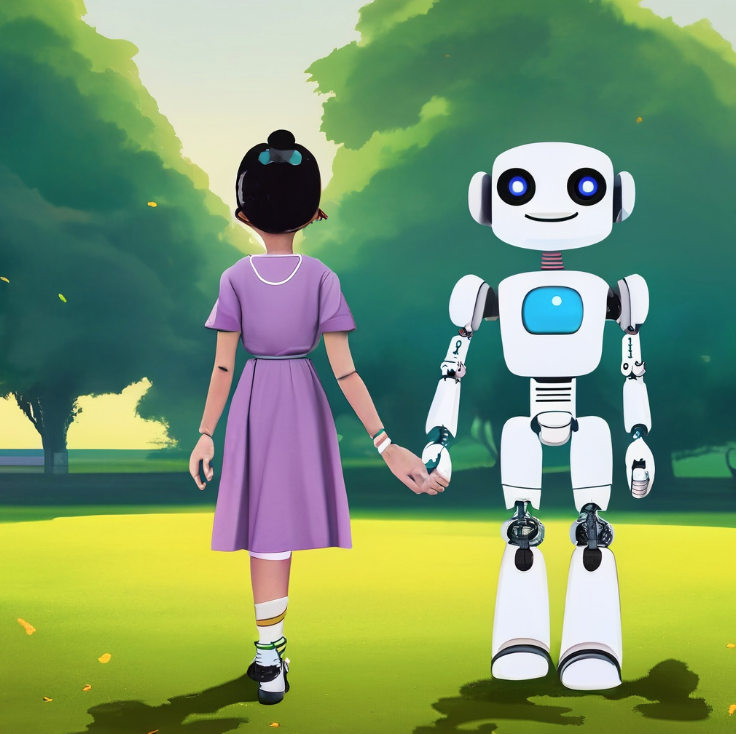Image created with Generative AI Adobe Firefly
Prompt: A young girl, holding hands with a robot, taking a walk in the park.
_____
One of my recent pet peeves and they are increasing as I age 🙂 is people trivializing AI tech and its future for our world, negatively or positively, by sharing shallow memes and the likes on social media.
I recently did a daylong session at my workplace on the Future of AI in Education, to understand its implications, benefits and drawbacks.
A few salient points that came out of it:
- Like any tech, its benefits or not, will depend on how we humans use it and more importantly feed it. AI is only as smart as the data it draws upon.
- When done right, it can free us humans of the so called ‘mundane’ tasks. We can focus more on ‘power skills’ as opposed to hard skills
- Interestingly, AI learns from us, our prompts, our biases; and that can have huge cultural and social impact. Areas of the world [we can guess which ones] will have increased access to this tech and hence an increased influence. So, would the disparity we see in the world be exacerbated even further?
- One interesting thought about generative AI is that’ how do we challenge if at all, what AI generates? And how can we as educators get the learners to be ‘critical thinkers’.
- How can we in the future validate what authenticity means? Will our definition of authenticity evolve? I think it will have to.
- Is AI our co-pilot or our auto-pilot mode? Is it. Friend or foe?
While these conversations were happening, I could not help but reflect how we are talking obviously from a local Canadian perspective. And what is the responsibility of developed nations on a global level?
AI used correctly [now that’s where we greedy humans come in] has the potential to revolutionize many industries. It has the potential to bring about numerous positive changes in society, including enhanced productivity, improved healthcare, and increased access to education [depending upon how we define education]. The use of AI has already improved efficiency, reduced costs, and increased accuracy in various fields. But this is not without the ethical and societal implications, like privacy, security, and job displacement; not loss – what happened to our world with Industrial Revolution, we saw the nature of work and jobs evolve with it, humans are still very much ‘employed’. The luddites believed otherwise even at the time.
Our mind is like this cup – it is mostly so full [at times with our own privileged and narrow mind-set] that we leave no room for anything else. Like the cup, we must empty our mind before it can accept anything new. Tech with each new development has forced that emptying of the cup. Those of us who can do so, will be able to refill it with the new and fresh dimensions and attitudes.
The best thing we can do is be prepared and informed of changes that will come our way. It is unawareness that gives rise to irrational fear – technophobia has been around since the 18th century. Some people were afraid of the printing press because they feared that it would lead to the spread of false information. A century or so later, during the period of Industrial Revolution, people were fearful of the railroad and in the 20th century it was the computers. As a common person, the best we can do is deepen our understanding – it is only education and awareness about AI that can help dispel myths and misconceptions and get one out of the fear zone.
‘In the long history of humankind (and animal kind, too) those who learned to collaborate and improvise most effectively have prevailed.’― Charles Darwin
Finally, Yuval Noah Harari in 21 Lessons for the 21st Century, a highly recommended read, has a very interesting take on the future of our world with AI and it’s not all glossy. His fears are real when he talks about machines overtaking humans now in the arena of the cognitive and beyond manual jobs, as AI is beginning to outperform humans in also understanding human emotions. But he also concludes by saying that the benefits for human society are likely to be immense – ‘it would therefore be madness to block automation in fields such as transport and healthcare just in order to protect human jobs. After all, what we ultimately ought to protect is humans – not jobs. Displaced drivers and doctors will just have to find something else to do.’ Ofcourse this is just a gist of a 300+ page book. Don’t take it at mere face value.
AI is really not about replacing the human or human interaction. There is an existential danger inherent in using AI, but that risk is existential in the philosophical rather than apocalyptic sense.
We don’t know what the future holds, but as we go along the journey, all in all, being well-informed is a good start – when we are not informed we become hostages to our prejudice.

